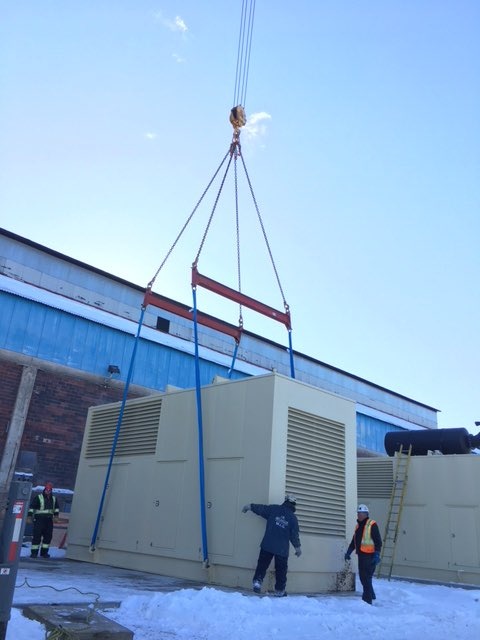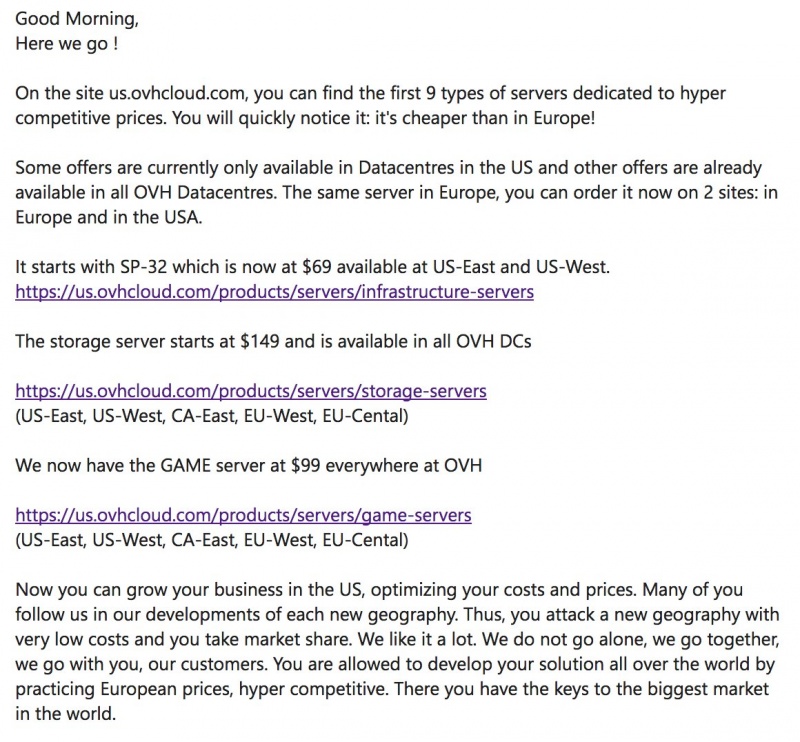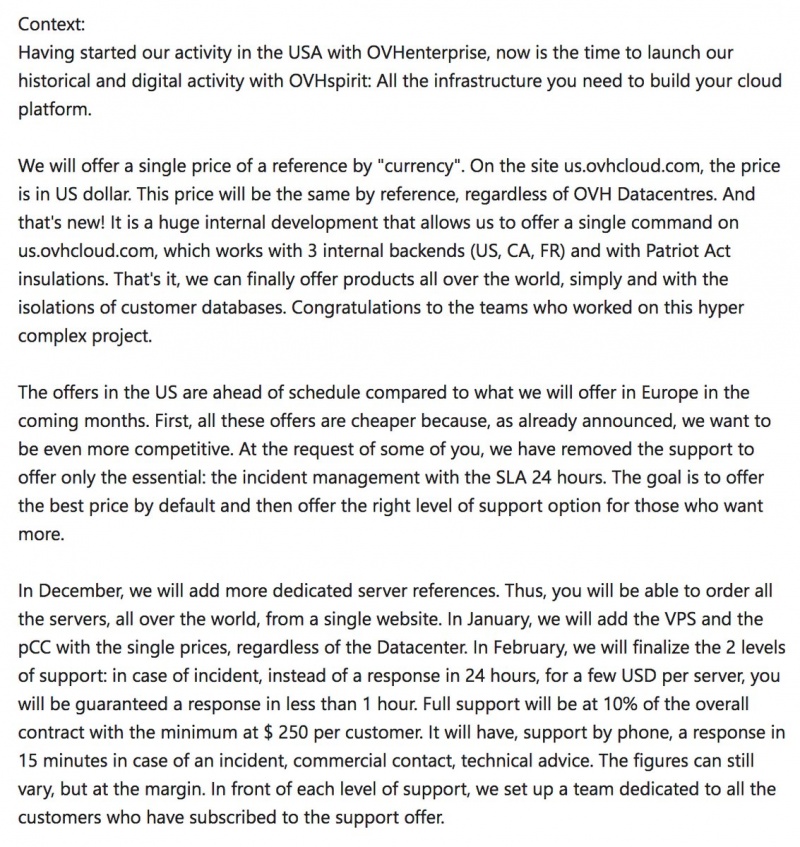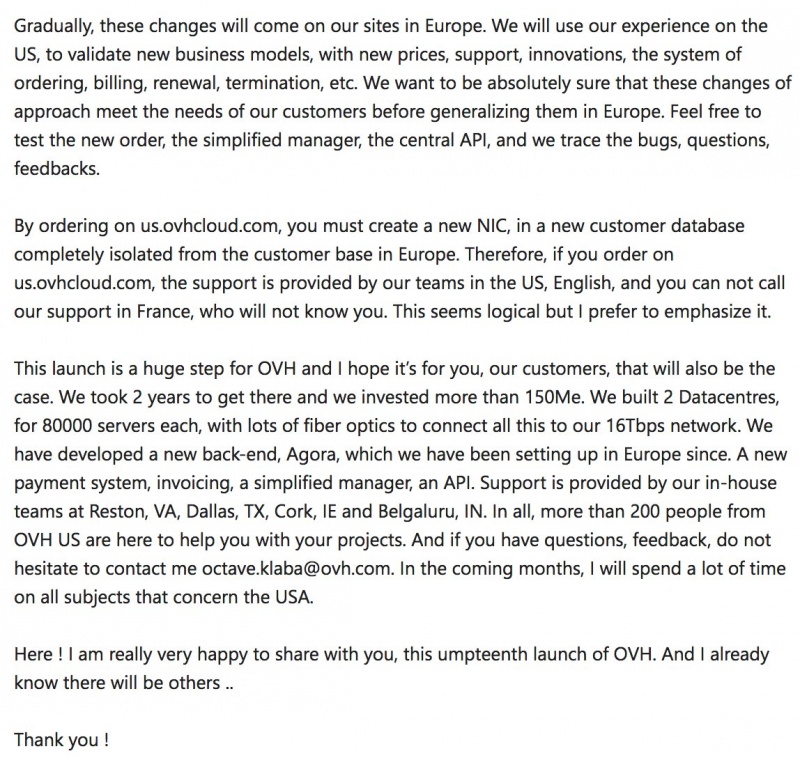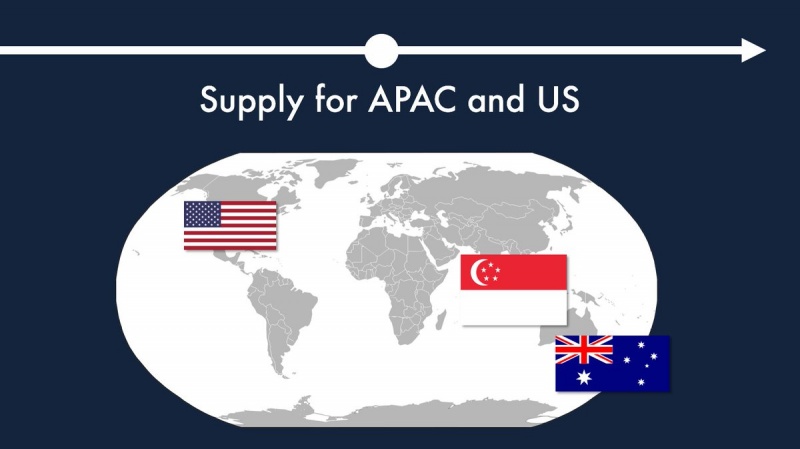
Бенгалуру, 21 ноября 2018 года, OVH, мировой лидер в облачной инфраструктуре, сегодня объявила о начале своей деятельности и добилась значительного роста с момента открытия первого индийского офиса в начале этого года. С бизнесом в Северной Америке, EMEA и APAC OVH привлекла свой международный опыт, чтобы предложить другое видение облака для растущей клиентской базы в Индии.
Основанная в 1999 году, сегодня OVH поддерживает 28 центров обработки данных в 12 местах на четырех континентах. OVH развертывает собственную глобальную волоконно-оптическую сеть и управляет всей цепочкой поставок для веб-хостинга, что упрощает доступ к облакам для компаний любого размера. С тех пор, как его операции в Индии начались в июне 2018 года, компания увидела большой импульс, когда клиенты по всей стране подписывают на нее выделенные серверы, веб-хостинг, частные и общедоступные облачные сервисы.
За последние два года рынок общественных облачных услуг в Индии достиг феноменального роста — до 1,8 млрд. Долл. США в 2017 году. К 2020 году этот показатель, как ожидается, достигнет 4,1 млрд. Долл. США. Из-за своего размера и масштаба Индия очень хорошо использует революцию данных, и мы хотим помочь индийским компаниям разрабатывать новые идеи через интеллектуальное облако
сказал Ален Фиокко, главный технический директор EVP (CTO), OVH
Возвращение к индийской экосистеме
Сегодня OVH запускает Digital Launch Pad в Индии для поддержки новых предприятий на цифровой арене и позволяет им пользоваться надежной и гибкой облачной инфраструктурой. Компания предлагает до 100 000 долларов для стартапов для развертывания решений, построенных на инфраструктуре OVH.
Комментируя новости, Sudheesh Sudhakaran, управляющий директор OVH India сказал: «Инициатива Digital Launch Pad является еще одним примером нашей приверженности нашим клиентам и нашей целью помочь им расти. Мы тщательно оценили индийский рынок и предоставляем то, что нужны нашим клиентам, что является безопасным форумом для экспериментов с различными проектами в сочетании с поддержкой экспертов OVH для разработки своих идей ».
Сильная траектория роста для OVH в Индии
В прошлом году OVH приобрела VMware vCloud Air. В Индии компания интегрировала сотрудников vCloud Air в организацию OVH, увеличивая размер, опыт и опыт своей местной команды. Расширенная группа продаж уже набрала несколько тысяч клиентов, и компания видит высокий рост.
Судхеш Судхакаран, управляющий директор OVH India объясняет
Этот рост будет продолжаться. Фактически, принимая во внимание силу нашей команды, рост, который мы наблюдали на сегодняшний день, и рыночные условия, а также высококачественный и рентабельный портфель OVH, мы считаем, что Индия может стать крупнейшей технологией OVH центр за пределами нашей глобальной штаб-квартиры во Франции
Чтобы еще больше увеличить этот рост в Индии, OVH набирает местных партнеров для тесного сотрудничества с компанией, использующей свои международные центры обработки данных в Европе и США.
Альтернативное, умное облако
Центральное место в деятельности OVH в Индии — это видение компании другого типа облаков. Опираясь на сердце революции данных, OVH предлагает альтернативное решение, которое освобождает облако от своих клиентов и партнеров, помогая им добиться успеха.
OVH помогает организации, независимо от их размера, контролировать свои данные, внедрять инновации и разрабатывать новые идеи в полной свободе посредством «умного» облака:
- Простое облако, быстрое и легкое в настройке
- Многопользовательское облако, близко ко всем во всем мире
- Доступное облако со справедливой и предсказуемой ценой
- Реверсивное облако, открытое и совместимое
- Прозрачное облако, которое функционирует ответственно.
Эта «интеллектуальная стратегия облака» вращается вокруг четырех продуктовых вселенных. Каждый из них ориентирован на клиента OVH другого типа и способ взаимодействия с продуктами и услугами OVH:
- OVHmarket — это цифровой инструментарий для ускорения роста. Он отвечает потребностям предпринимателей, которые хотят использовать возможности цифровых технологий для развития своего бизнеса. Этот юниверс включает в себя ряд веб-решений, телекоммуникационных и облачных решений, которые быстро реализуются, просты в использовании, конкурентоспособны по цене и поддерживаются местными партнерами OVH.
- OVHspirit включает в себя все инфраструктуры, необходимые для создания облачной платформы. Инфраструктура, аппаратные и сетевые энтузиасты, которые хотят создать облачную платформу для себя или своих клиентов, могут использовать мощь масштабируемой облачной инфраструктуры с несколькими локальными областями, основанной на передовых технологиях, разработанных для конкретных потребностей, и предлагает непревзойденное соотношение цены и качества ,
- OVHstack — это платформа общедоступных облаков, основанная на открытых стандартах. Он нацелен на сторонников облачного подхода, которым необходимо разрабатывать масштабируемые приложения в облаке. Они получают общедоступное облако, которое развертывается по всему миру, но легко интегрируется в свою экосистему и остается обратимым.
- OVHenterprise — это альтернативное облако, которое обеспечивает успешное цифровое преобразование. Эта вселенная направлена на лиц, принимающих решения, которые хотят достичь своих стратегических целей, используя альтернативный поставщик облачных вычислений. Они сохраняют контроль над своими данными, используя гибридное облако, основанное на публичных и частных облаках, предлагаемых OVH, а также на любых других облаках, доступных на рынке.
Работа с гигантами технологической индустрии: VMware и Intel
OVH продолжает расширять свои давние глобальные партнерские отношения с VMware и Intel, поскольку она расширяет свой бизнес в Индии.
VMware и OVH создали прочное партнерство за последнее десятилетие, охватывающее проектирование, маркетинг, продажи и поддержку. Обладая статусом VMware Cloud Verified, а также с 7 Партнерами года на протяжении 9 лет, OVH тесно сотрудничает с VMware для предоставления инновационного, но доступного Private Cloud на основе полного пакета VMware SDDC. Благодаря приобретению компанией OVH VMware vCloud Air в прошлом году, клиенты теперь могут также выиграть от повышения производительности сети и увеличения мобильности рабочей нагрузки через глобальную сеть OVH.
Intel помогла OVH разработать свой широкий спектр серверов в течение пятнадцати лет. Благодаря этому сотрудничеству OVH может поставлять оборудование, соответствующее потребностям и обычаям для своих клиентов, с максимальной производительностью. OVH также смог внедрить инновации, включив некоторые из новейших технологий Intel, таких как масштабируемые процессоры Intel® Xeon® и твердотельные накопители 3D NAND. Совсем недавно OVH также включил твердотельный накопитель Intel® Optane ™ DC SS на наших высокопроизводительных серверах и хостах VMware vSAN.
